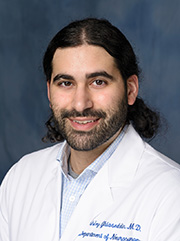Patients from 40 states & 3 countries
Our patients have traveled from around the world for our leading-edge programs, clinical trials, personalized treatment plans and quality of life and survivorship programs for both adult and pediatric brain tumor patients.
100+ physicians, researchers, scientists and staff
Our team at the Wells Center for Brain Tumor Therapy at UF includes experts in several specialties, including specialty surgical care, radiation therapy, laser ablation therapy, neuro-oncology care, genetic testing and precision medicine.
Over $10 million a year invested in research funding
From immunotherapy to chemotherapy, optune therapy and unique clinical trials, we are leading the country in searching for a cure for brain tumors.
Fast Facts
Our clinical trials portfolio includes:
- More than 40 research studies
- More than 10 Pediatric-focused studies
- Five phase-1 Trials
- First-In-Human treatments
- Investigational New Drugs developed at UF
Listed below are the clinical trials that we are currently enrolling at UF, for general questions about clinical trials please contact John Lybarger at John.Lybarger@neurosurgery.ufl.edu
Featured Trial
IMPACT
Phase I Study —To Assess Safety and Feasibility of IL-8 Receptor Modified Patient-derived Activated CD70 CAR T cell Therapy in CD70+ and MGMT-unmethylated Adult GBM
Subject Inclusion criteria:
- Age: 18 years and older (Adult, Older Adult)
- Newly-diagnosed de novo GBM based on the absence of the a previous history of brain tumor (WHO Grade IV glioma) by histopathology or molecular studies. (Secondary GBM not eligible)
- The tumor must have a supratentorial component.
- MGMT-unmethylated and CD70 positive (≥20%, 1+)
See full inclusion criteria and learn more about the IMPACT Clinical Trial (Link to the CT.gov https://classic.clinicaltrials.gov/ct2/show/NCT05353530)
Contact Phuong Deleyrolle to hear more about the IMPACT Clinical Trial (phuong.deleyrolle@neurosurgery.ufl.edu)
PNOC 020
A Phase I/II Study of RNA-lipid particle (RNA-LP) vaccines for Newly Diagnosed Pediatric High-Grade Gliomas (pHGG) and Adult Glioblastoma (GBM).
Subject inclusion criteria:
- Age: 21 Years and older (Adult, Older Adult)
- Histopathologically proven newly-diagnosed de novo GBM (WHO Grade IV glioma) (secondary GBM not eligible) that is MGMT unmethylated.
- The tumor must have a supratentorial component.
- Bone Marrow, Renal and Hepatic tests
See full inclusion criteria and learn more about the PNOC 020 Clinical Trial
Contact Marcia Hodik to hear more about the PNOC 020 Clinical Trial.
Browse or search current neurosurgery clinical trials
ACTION
Adoptive Cellular Therapy following Dose-Intensified Temozolomide in Newly-diagnosed Pediatric High-grade Gliomas
BRAVO
BRAVO: Newly-Diagnosed Brain Stem Gliomas Treated with Adoptive Cellular Therapy during Recovery from Focal Radiotherapy Alone or Radiotherapy and Dose-intensified Temozolomide
PBTC-053
A Pediatric Brain Tumor Consortium Phase I/ II and Surgical Study of CX-4945 in Patients With Recurrent SHH Medulloblastoma
RENEW
Pilot Study of Feasibility of CMV RNA-Pulsed Dendritic Cells Vaccines for the treatment of Newly Diagnosed Glioblastoma Patients
PBTC-055
Phase I/II Trial of Dabrafenib, Trametinib, and Hydroxychloroquine (HCQ) for BRAF V600E-mutant or Trametinib and HCQ for BRAF Fusion/Duplication Positive or NF1-associated Recurrent or Progressive Gliomas in Children and Young Adults
PNOC 020
A Phase I/II Study of RNA-lipid particle (RNA-LP) vaccines for Newly Diagnosed Pediatric High-Grade Gliomas (pHGG) and Adult Glioblastoma (GBM).
PNOC-021
PNOC 021: A Phase I Trial Evaluating the Combination of Trametinib and Everolimus in Pediatric and Young Adult Patients with Recurrent Low Grade Gliomas
PEACH
Precision mEdicine and Adoptive Cellular tHerapy for the treatment of recurrent neuroblastoma and newly diagnosed diffuse intrinsic pontine glioma (DIPG).
PNOC 019
A Randomized, Blinded, Pilot Trial of Neoadjuvant Checkpoint Inhibition followed by Combination Adjuvant Checkpoint Inhibition in Children and Young Adults with Recurrent or Progressive High Grade Glioma (HGG)










